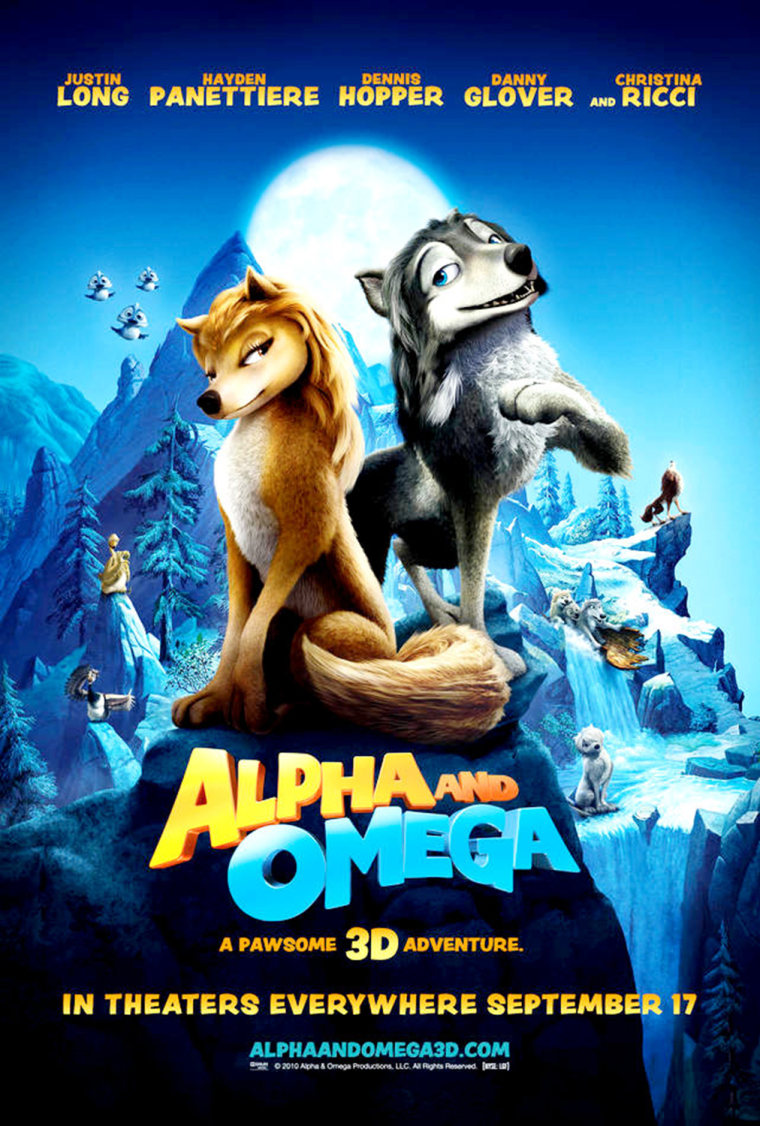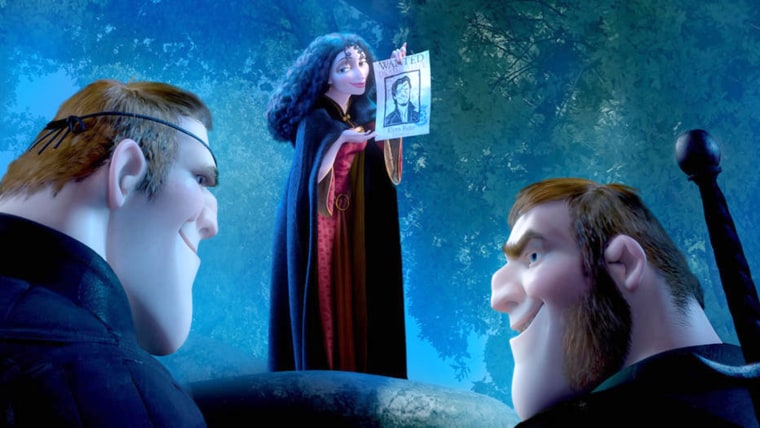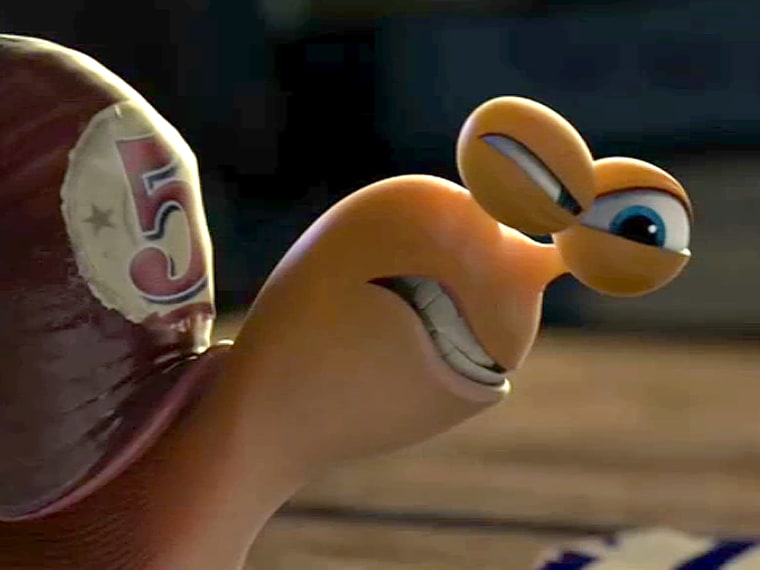The new animated movie "Turbo" offers exactly what the trailers promise. A snail with a need for speed gains super-quickness in a freak accident, and his human and mollusk pals help him fulfill his dream of racing in the Indianapolis 500.
But that simple story is rare in modern kids' movies, many of which jam multiple complicated plotlines, dozens of characters, and jokes aimed at parents into ever-expanding run times, often with a 3-D surcharge. ("Turbo" is showing in both 3-D and 2-D.)
"Cars 2" was widely criticized for presenting preschoolers with a complex international espionage plot, though some reviewers appreciated the intricacy. Late critic Roger Ebert loved the 2011 film, calling it a "movie with such complexity that even the cars sometimes have to pause and explain it to themselves."
Tangled tales are hardly new, even in the most beloved children's films.
"Watch Disney's 'Cinderella' and you will see sub-plots about the mice and the footman and the step-sisters' music lessons and the first dress that the mice make that then gets torn apart," said Nell Minow, who advises parents about movies as The Movie Mom.
And not everyone minds the complexities. "Turbo" came in third at the box office in its opening weekend, trailing the infinitely more complicated "Despicable Me 2."
But it's often the way the plots are presented that's at issue.
"I think the real issue is the quicker cuts and more explosive effects," Minow told NBCNews.com. "Everything is more sped-up and colorful and loud — in part a reflection of the increased competition for decreased attention spans. So it feels like a lot more is coming at us."
Modern kids' movies aren't just seen once. If they're enjoyable, they'll almost always end up being viewed on home video, sometimes over and over again. And studios, knowing parents want films that don't bore them to death on repeated viewing, are peppering the scripts with jokes that mom and dad will appreciate and kids will completely miss.
"There's definitely a trend toward that humor being of the wink-wink, nudge-nudge variety — particularly since (the 2001 film) 'Shrek' came out," said Betsy Bozdech, managing editor of Common Sense Media, a non-profit group that studies the effects of media on children.

Bozdech remembers a scene in "Shrek" where the friendly green ogre sees a giant tower belonging to the villain and jokes, "Gee, think he's compensating for something?" She then heard a child in the audience respond with "I don't get it."
"And I was glad that they didn't!" Bozdech said. "I think that kind of adult-targeted humor isn't all bad; it's whether it's done artfully/well or quickly and sloppily." She cites the 2010 animated wolf movie "Alpha and Omega" as a film that really wasn't aimed at youngsters, despite its cute posters. "Our critic said it ultimately felt more like a teen romance than a kids' movie," she notes.
For Meghan Kelly Anderson, a mom of two from the Boston area, complex movies are OK, but those with mocking dialogue can be troublesome.
"I don't mind the fast pace of movies so much as I mind the sassy talk/sarcasm in some kids' movies," she told NBCNews.com. "(Four-year-old daughter) Catherine likes 'Tangled' but the old witch's sarcastic talk was bothersome. And Catherine didn't get it, either. 'Why is she saying she's the bad guy?' she kept asking me. I don't like it when a children's movie tries to be too hip. Or too crass. Please allow me to adjust the onion on my belt."
Joanne Cantor, author of "Mommy, I'm Scared: How TV and Movies Frighten Children and What We Can Do to Protect Them," and an expert on the psychology of media, says that kids really haven't changed over the decades. What scared preschoolers in the 1960s still scares them today.

"When children are very young, their brains are largely the same as they were 25 and 50 years ago," she told NBC News.com. "Young children still don't understand the difference between fantasy and reality until they're about six or seven years old. They still don't understand plots that are too fast-moving for them to absorb. They are still much more sensitive to vivid visual images, especially grotesque looking characters and events, than to motivations and implied actions or feelings."
Cantor's organization, Your Mind on Media, recently published a study showing that 76 percent of 5-12 year-olds said they had been scared by a TV show or movie, and in most cases, movies were the culprit. Even G-rated movies, such as "Finding Nemo," "The Wizard of Oz," and "101 Dalmatians" made the list.
For some parents, seeking out appropriate movies is just a matter of research.
"We really like showing the (Hayayo) Miyazaki films like 'Spirited Away,' 'My Neighbor Totoro,' 'Ponyo,' etc.) because they are simple and sincere — and also feature girls as heroes, which seems to be rare in the rest of Hollywood," Anderson said.
Bozdech urges parents to do their homework before taking their children to a certain film, and also applauds the Miyazaki films and other gems that can be found on DVD or online. Her site offers movie reviews and information, and a special section dubbed "Watch Out!" warns about certain family films that have unexpected cursing, sexy, scary or traumatizing scenes.
But she also notes that parents shouldn't overprotect their children from films that may present challenging issues, as long as they keep the lines of communication open.
"Some of the thrill of going to the movies as a kid is seeing something that opens your eyes a little bit or helps you get a perspective beyond your own," she said. "Movies and TV shows can help kids deal with fears and concerns that they're bound to have at some point; if you talk about them together and help defuse them before they happen in real life, kids will start to develop a solid foundation for coping with life's inevitable ups and downs."
